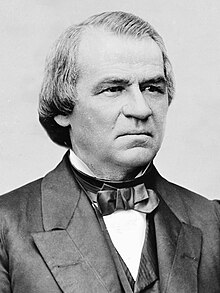📖 Presidential Profile
Comprehensive overview of leadership, policies, and historical significance
📋 Biography & Political Journey
Early Life and Political Rise
Andrew Johnson was born on December 29, 1808, in Raleigh, North Carolina, to Jacob Johnson and Mary McDonough Johnson. His father died when Andrew was three, leaving the family in poverty. Johnson never attended school and was apprenticed to a tailor at age 14. He learned to read from his wife Eliza McCardle, whom he married in 1827. Moving to Tennessee, Johnson established a successful tailoring business in Greeneville and entered local politics as a champion of working-class interests.
Johnson’s political career began in municipal government, serving as alderman and mayor of Greeneville before winning election to the Tennessee House of Representatives in 1835. He was a staunch Jacksonian Democrat who advocated for the common man and opposed the planter aristocracy. Johnson served in both houses of the Tennessee legislature, the U.S. House of Representatives (1843-1853), as Governor of Tennessee (1853-1857), and in the U.S. Senate (1857-1862). Uniquely among Southern senators, Johnson remained loyal to the Union when Tennessee seceded, making him the only Southern senator to retain his seat during the Civil War.
Lincoln appointed Johnson as Military Governor of Tennessee in 1862, where he worked to restore Union control and rebuild state government. His loyalty to the Union and Southern background made him an attractive vice-presidential candidate for Lincoln’s 1864 re-election campaign on the National Union ticket. Johnson became president on April 15, 1865, following Lincoln’s assassination, inheriting the monumental task of Reconstruction at one of the most critical moments in American history.
Impeachment and Constitutional Crisis
Johnson’s presidency was dominated by fierce conflicts with the Radical Republican Congress over Reconstruction policy. His lenient approach toward the defeated South and opposition to civil rights legislation put him at odds with Republicans who wanted harsh punishment for Confederate leaders and strong protections for freed slaves. Johnson vetoed the Civil Rights Act of 1866 and opposed the 14th Amendment, arguing that Southern states should not be forced to ratify it for readmission to the Union. His firing of Secretary of War Edwin Stanton in violation of the Tenure of Office Act provided the pretext for impeachment proceedings in 1868. The House voted to impeach Johnson on eleven articles, primarily related to his removal of Stanton and his inflammatory speeches criticizing Congress. Johnson escaped conviction in the Senate by a single vote, with seven Republican senators joining all Democrats in acquitting him.
The Presidential Pardon Circus
One of the most peculiar aspects of Johnson’s presidency was his obsessive granting of presidential pardons to former Confederates, which became almost a daily ritual at the White House. Johnson would hold regular “pardon parties” where former Confederate officers and officials would line up outside his office, often bringing letters of recommendation and gifts. The president seemed to relish the role of magnanimous pardoner, and witnesses described how he would dramatically sign pardon documents while delivering impromptu speeches about mercy and reconciliation. “I am the Moses of the colored people,” Johnson once declared, seemingly oblivious to the irony that his pardons were restoring power to the very people who had oppressed those he claimed to champion. By the end of his presidency, Johnson had issued over 7,000 pardons, leading critics to joke that he had pardoned everyone in the South except Jefferson Davis—and that was only because Davis never asked.
Humor & Jokes
Johnson's Stubborness
Andrew Johnson was so stubborn, mules looked at him for inspiration. Presidential pigheadedness elevated to…
Read More →Greatest Wins
⚖️ Ratification of the 13th Amendment Abolishing Slavery
Johnson supported the constitutional amendment that permanently ended slavery in America, cementing Lincoln's Emancipation Proclamation…
Read More →Epic Fails
🗣️ The Swing Around the Circle Campaign Tour
Johnson's disastrous 1866 speaking tour featured inflammatory rhetoric and public confrontations that damaged his reputation…
Read More →